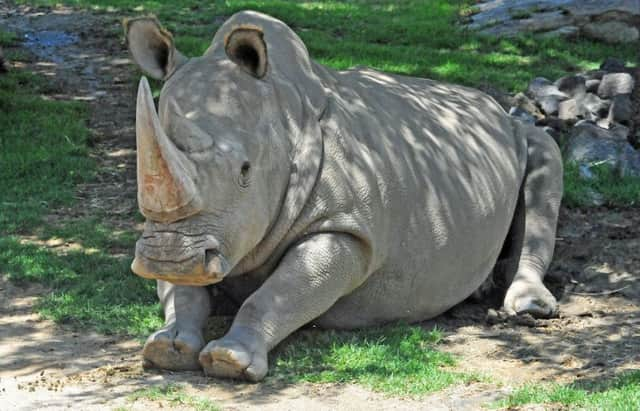Scientists could use embryos to save white rhino from extinction


Writing in the journal Nature Communications, researchers said they have succeeded in creating embryos using frozen northern white rhino sperm and eggs from a southern white rhino.
It is the first time such hybrid embryos have been created.
Advertisement
Hide AdAdvertisement
Hide AdThe scientists from Europe and the United States hope it will provide a pathway to saving the northern white rhino sub-species, of which only two females remain.
They plan to harvest the females’ egg cells soon and produce “pure” northern white rhinos to be borne by a southern white surrogate in three years.
They are also working on a second method that would see sperm and eggs produced from preserved cells of northern white rhinos.
A proposed ivory ban in Britain could meanwhile be extended to protect hippos, walruses and narwhals as well as elephants, the UK Government has said.
Ministers have proposed tough legislation to ban the sale of ivory items of all ages, with only a few “narrowly defined” exemptions, as part of efforts to protect elephants from poaching.
Around 20,000 elephants a year are being slaughtered for their ivory, and wildlife campaigners believe reducing global demand for their tusks is an important part of ending the carnage.
But concerns have been raised that other animals such as hippos are at risk of poaching for their ivory and there has been an increase in trade in hippo and other non-elephant ivory in the UK because of the focus on elephants in the ban.
Both Labour and the Conservative former environment secretary Owen Paterson have called for the Ivory Bill currently going through Parliament to protect other ivory-bearing species, with hippos of particular concern.
Advertisement
Hide AdAdvertisement
Hide AdThe Government has responded to the concerns by announcing it will consult on extending the scope of the Bill to protect other ivory-bearing species such as hippos, walruses and narwhals, as well as sperm whales and killer whales.
Hippos are listed as “vulnerable” to extinction on the International Union for Conservation of Nature (IUCN) Red List of Threatened Species, with their population thought to have declined around 12% in the last decade.
The Government has also brought forward an amendment to the Bill to ensure that if necessary ivory from all animals could be banned, not just ones covered by the Convention on International Trade in Endangered Species (Cites).
This would allow the ban to be extended to species such as warthogs and even the tusks of prehistoric mammoths which could help continue demand for elephant ivory, if a case for their inclusion was made during the consultation.
The consultation will begin as soon as practicable after the Bill has become law, and will not delay the introduction of the ban on dealings in elephant ivory, ministers said.
Environment Secretary Michael Gove said: “Our ivory ban is one of the toughest in the world and will provide vital protection for the African and Asian elephant from the scourge of illegal poaching.
“But there are many more precious species, like the hippo and walrus, which could fall victim to the callous trade in ivory.
“The Government will therefore consult on extending the ivory ban to other ivory-bearing animals.
Advertisement
Hide AdAdvertisement
Hide Ad“We are determined to end this insidious trade and make sure ivory from any animal is never seen as a commodity for financial gain or a status symbol.”
Proposed Labour changes to the Bill, which sought to extend the scope of the ivory ban to other animals, were defeated in the Commons.
The Bill went on to receive its third reading unopposed and has now been sent to the House of Lords for further scrutiny.
Shadow environment secretary Sue Hayman welcomed the passage of the Bill, saying it was a “welcome step forward for the future of global elephant populations”.
She added: “I look forward to working with colleagues from right across the House to ensure we continue to do everything else we can in our power to stamp out the global ivory trade and preserve these iconic animal species for generations to come.”
Tory MP Sir David Amess, who has consistently campaigned against the ivory trade, also welcomed the move and said: “This is a day of celebration for all animals who have horns.”
